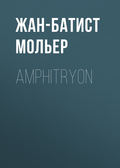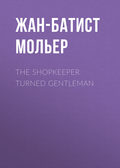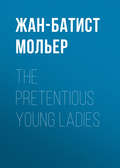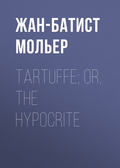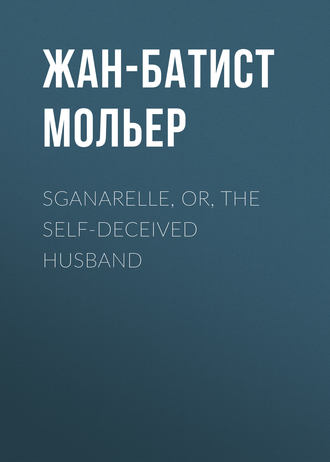
Мольер (Жан-Батист Поклен)
Sganarelle, or, the Self-Deceived Husband
SCENE VII. – LELIO, GROS-RENÉ
GR. – RE. Here we are at last; but, sir, if I might be so bold, I should like you to tell me one thing.
LEL. Well, speak.
GR. – RE. Are you possessed by some devil or other, that you do not sink under such fatigues as these? For eight whole days we have been riding long stages, and have not been sparing of whip and spur to urge on confounded screws, whose cursed trot shook us so very much that, for my part, I feel as if every limb was out of joint; without mentioning a worse mishap which troubles me very much in a place I will not mention. And yet, no sooner are you at your journey's end, than you go out well and hearty, without taking rest, or eating the least morsel.
LEL. My haste may well be excused, for I am greatly alarmed about the report of Celia's marriage. You know I adore her, and, before everything, I wish to hear if there is any truth in this ominous rumour.
GR. – RE. Ay, sir, but a good meal would be of great use to you to discover the truth or falsehood of this report; doubtless you would become thereby much stronger to withstand the strokes of fate. I judge by my own self, for, when I am fasting, the smallest disappointment gets hold of me and pulls me down; but when I have eaten sufficiently my soul can resist anything, and the greatest misfortunes cannot depress it. Believe me, stuff yourself well, and do not be too cautious. To fortify you under whatever misfortune may do, and in order to prevent sorrow from entering your heart, let it float in plenty of wine.
[Footnote: This is an imitation of Plautus' Curculio, or the Forgery. The Parasite of Phæaedromus, who gave his name to the piece, says (ii. 3): – "I am quite undone. I can hardly see; my mouth is bitter; my teeth are blunted; my jaws are clammy through fasting; with my entrails thus lank with abstinence from food, am I come… Let's cram down something first; the gammon, the udder, and the kernels; these are the foundations for the stomach, with head and roast-beef, a good-sized cup and a capacious pot, that council enough may be forthcoming."]
LEL. I cannot eat.
GR. – RE. (Aside). I can eat very well indeed; If it is not true may I be struck dead! (Aloud). For all that, your dinner shall be ready presently.
LEL. Hold your tongue, I command you.
GR. – RE. How barbarous is that order!
LEL. I am not hungry, but uneasy.
GR. – RE. And I am hungry and uneasy as well, to see that a foolish love-affair engrosses all your thoughts.
[Footnote: Shakespeare, in The Two Gentlemen of Verona
(Act ii., Sc. I), has the following:
Speed. …Why muse you, sir? 'tis dinner-time.
Val. I have dined.
Speed. Ay, but hearken, sir; though the chameleon, love, can feed on the air, I am one that am nourished by my victuals, and would fain have meat. O, be not like your mistress; be moved, be moved.]
LEL. Let me but get some information about my heart's delight, and without troubling me more, go and take your meal if you like.
GR. – RE. I never say nay when a master commands.
SCENE VIII. – LELIO, alone
No, no, my mind is tormented by too many terrors; the father has promised me Celia's hand, and she has given me such proofs of her love that I need not despair.
SCENE IX. – SGANARELLE, LELIO
SGAN. (Not seeing Lelio, and holding the portrait in his hand). I have got it. I can now at my leisure look at the countenance of the rascal who causes my dishonour. I do not know him at all.
LEL. (Aside). Heavens! what do I see? If that be my picture, what then must I believe?
SGAN. (Not seeing Lelio). Ah! poor Sganarelle! your reputation is doomed, and to what a sad fate! Must… (Perceiving that Lelio observes him he goes to the other side of the stage).
LEL. (Aside). This pledge of my love cannot have left the fair hands to which I gave it, without startling my faith in her.
SGAN. (Aside). People will make fun of me henceforth by holding up their two fingers; songs will be made about me, and every time they will fling in my teeth that scandalous affront, which a wicked wife has printed upon my forehead.
LEL. (Aside). Do I deceive myself?
SGAN. (Aside). Oh! Jade!
[Footnote: The original is truande, which, as well as the masculine truand, meant, in old French, a vagabond, a rascal; it is still retained in the English phrase "to play the truant."]
were you impudent enough to cuckold me in the flower of my age? The wife too of a husband who may be reckoned handsome! and must be a monkey, a cursed addle-pated fellow…
LEL. (Aside, looking still at the portrait in Sganarelle's hand).
I am not mistaken; it is my very picture.
SGAN. (Turning his back towards him). This man seems very inquisitive.
LEL. (Aside). I am very much surprised.
SGAN. What would he be at?
LEL. (Aside). I will speak to him. (Aloud). May I… (Sganarelle goes farther off). I say, let me have one word with you.
SGAN. (Aside, and moving still farther). What does he wish to tell me now?
LEL. Will you inform me by what accident that picture came into your hands?
SGAN. (Aside). Why does he wish to know? But I am thinking… (Looking at Lelio and at the portrait in his hand). Oh! upon my word, I know the cause of his anxiety; I no longer wonder at his surprise. This is my man, or rather, my wife's man.
LEL. Pray, relieve my distracted mind, and tell me how you come by…
SGAN. Thank Heaven, I know what disturbs you; this portrait, which causes you some uneasiness, is your very likeness, and was found in the hands of a certain acquaintance of yours; the soft endearments which have passed between that lady and you are no secret to me. I cannot tell whether I have the honour to be known by your gallant lordship in this piece of gallantry; but henceforth, be kind enough to break off an intrigue, which a husband may not approve of; and consider that the holy bonds of wedlock…
LEL. What do you say? She from whom you received this pledge…
SGAN. Is my wife, and I am her husband.
LEL. Her husband?
SGAN. Yes, her husband, I tell you. Though married I am far from merry; you, sir, know the reason of it; this very moment I am going to inform her relatives about this affair.
[Footnote: The original has mari-tres-marri; literally, "husband very sad;" marri being the old French for sad: the ancient plays and tales are full of allusions to the connection between these two words, mari and marri.]
SCENE X. – LELIO, alone
Alas! what have I heard! The report then was true that her husband was the ugliest of all his sex. Even if your faithless lips had never sworn me more than a thousand times eternal love, the disgust you should have felt at such a base and shameful choice might have sufficiently secured me against the loss of your affection… But this great insult, and the fatigues of a pretty long journey, produce all at once such a violent effect upon me, that I feel faint, and can hardly bear up under it.



